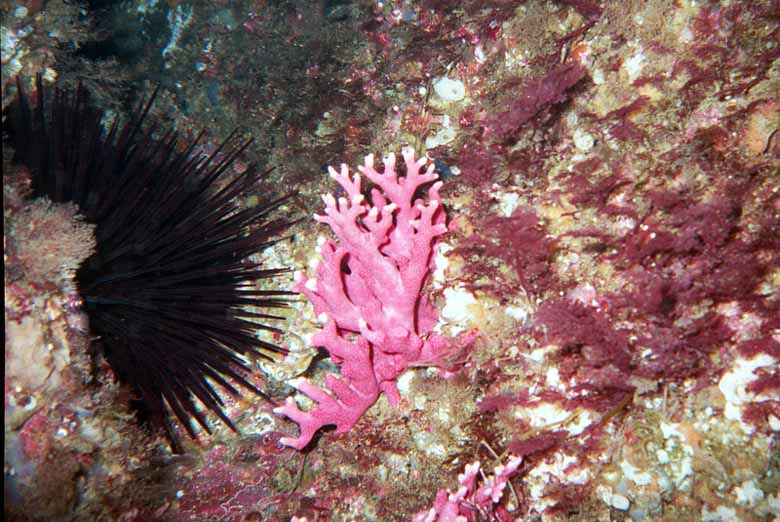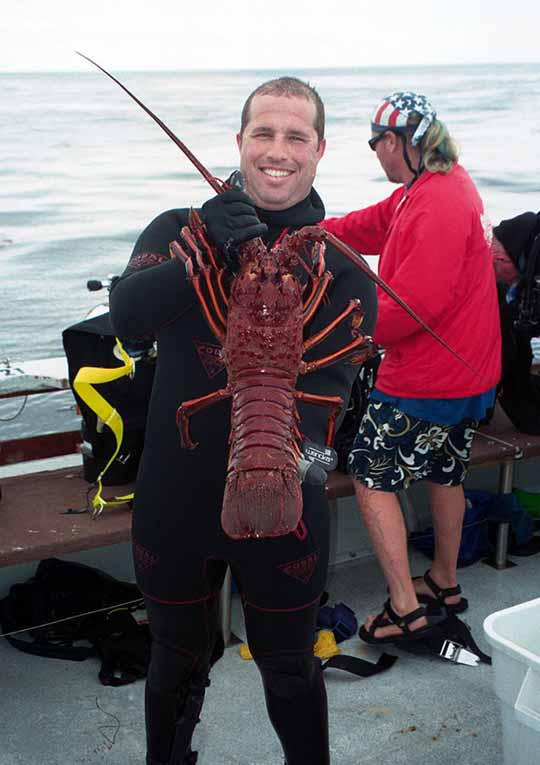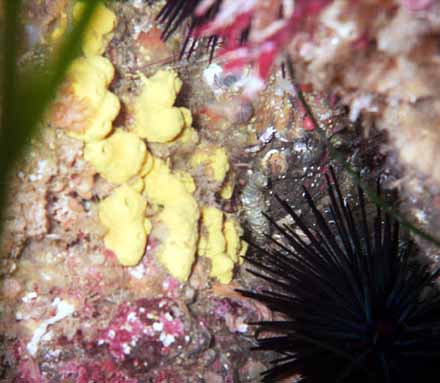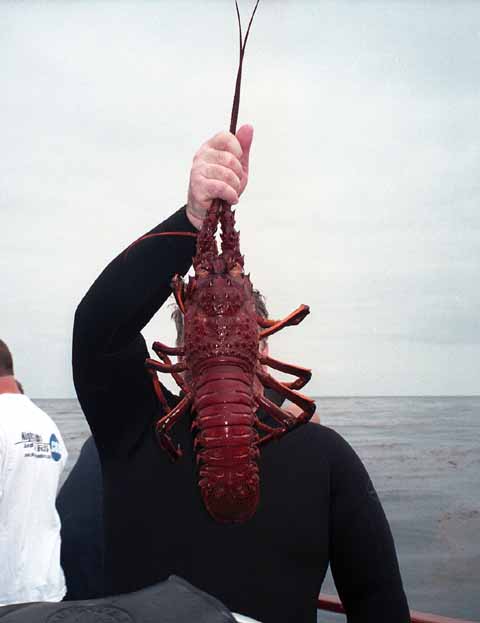There is just about no better way to spend a day than diving and
this was going to be a great day for it. The ocean was flat and it was
time to go.
It was so much nicer for diving when I lived in the Valley.
22nd Street landing in San Pedro was about the same distance as the
Peace in Ventura and Truth Aquatics in Santa Barbara was just a
bit farther. Now it took a long annoying drive to the Great Escape,
but this was the first time I had ever heard of a one day charter to
The Cortes Banks and I didn't want to miss it. It's at least 9 hours
cruising each way, but the diving there should make the trip worth
it.
When I got there it was great, I immediately saw divers I had met
before and some I knew, but had never met. The people on this trip are
real serious divers.
The DIR contingent was there represented by Michael, John and Terry
as well as others. Terry was acting as one of the dive masters for the trip.
Chris, Michael, Frank and others were there as well. Actually though, it
was a mixed group with some less experienced divers and some that were
not from the area. Movie for the night was cave penetration by the WKPP
folks, but before very long, it was time to dive the bunks.
When I got up, the morning was warm enough to be comfortable and the
seas were calm. It was overcast, but the visibility across the water
was really good. There were three other boats on the Banks.
We were supposed to have near a half hour to go, so people were
slowly getting geared up, except for Chris who was ready to jump in.
I got my last gear on as we anchored.
The skipper gave a description of the spot. It was the usual.
Some pinnacles. About 90 feet, but deeper in front of the boat and
shallower behind. I jumped in and went down quickly and came up
just as fast. In fine tradition, I had forgotten to turn on my
computer.
I really notice the little mistakes you make when you don't
dive regularly. I have always forgotten pieces of gear when entering,
but it seems to get a bit worse when I don't dive real regularly. It
always works out though.
I went back down and paused to get centered with where I was and
figure out where I should be. It was dim at the bottom, but the vis
was 50 or 60 feet and the water was crystal clear. I moved out a
bit deeper and there was lots of good terrain with walls, ledges and
rocks big enough to look under. With water that clear, there is a lot
of small kelp on the bottom.
I was trying to move fast, but it was nice that I had no problem
getting relaxed and falling into the dive habit. The extra gear
for the pony bottle was unnoticeable. I saw some antennas sticking
from under a rock, but it was obviously a bit short. A little further
on I saw another bug under a rock, but this one looked to be
almost 2 pounds. I tried to grab it with both hands coming together
from the sides, but I was a bit slow and the bug had time to get
moving. That was that.
It was great terrain and I kept going on and seeing occasional
shorts, but I was getting lower on air, so I headed to where water was
shallower and kept searching. Pretty soon I had to go on up.
A few people came up with lobster, but nothing special. Tanks
were getting filled and people got organized as the boat moved to the
next spot. Captain Tim said that this was nearer 80 feet and that
we were between a couple large pinnacles.
Again it was good broken up terrain with rocks and ledges. I went
east which was just a bit shallower. It is beautiful diving with all
different kinds of kelps and smaller red algae on the rocks. At
Cortes Banks, probably the commonest kelp is a lamanaria that
sticks off the bottom about three feet with a crown of leaves that
make it a bit like a small palm tree. There is a lot of these and they
are really strong, so they are real good to pull against as you travel
along or if the surge is against you. You are mostly looking under
these anyway and it is easy to travel between them, beneath their
their "leaves". There are lots of smaller macrocystis algae here, but
none go much higher than 20 feet from the bottom. All around are lots
of large red urchins. While there are lots of small fish everywhere, I
saw few of the 10 pound sheepsheads that I've always had following
me in the past when I was diving here. There were a number of
sheepsheads, but they were in the 1 and 3 pound range. I hope it's
not because of over fishing even here.
I came into a bit of a "valley" between to rock "walls" that went
up about 15 feet from the bottom. The bottom was rock with some sand
and there were lots of microwave sized and smaller rocks on it. It
was perhaps 20 feet wide and 40 feet long. Quickly I saw a small
bug and so figured there might be more. Sure enough, this was where
they were hanging out. I grabbed one and bagged it and started
to position to grab one that looked maybe just legal, when I noticed a
nice big one about 6 feet away. I grabbed at it with two hands from the
sides and was plenty fast enough this time. I kept moving in this small
canyon and grabbed two more from under rocks. It was impossible to say
why they were in this on place, but this is where they were. In the
rest of the area I found a number of bugs, but only one other was
legal. Cool. I had dinner and my grabbing was what it needed to be.
There are these pinnacles all over the place. They might be better
called plateaus, because they are mostly flat on top. They tend to be
only 10 feet wide at the top and are usually only that long or
they may extend a ways as a ridge. The top of the plateaus are covered
with a thick growth of bright emerald colored eel grass. I would
think that the eel grass was actually growing deeper here than it should
be able to flower, but it might be a different specie or have a
different propagation strategy there.
The third spot was a bit shallower, but essentially the same terrain.
I looked and looked, but didn't find anything legal sized. Even if there
are no bugs, there is an awful lot to see. I was using my light some to
check in holes. Everywhere I looked, there seemed to be this one certain
type of 4 inch gobie stashed in holes and nooks. There is a real diversity
at the banks. You won't necessarily see an abundance of any but a few
species, but you will see individuals of an amazing variety of different
species. Nice dive, but no bugs.
It was after this dive that Michael Kane told about a pinnacle that
they had seen while scootering around. He said that the entire thing was
covered by large pink abalone.
The last dive site of the day was going to be at the wreck of a large
cement hulled ship that had run aground here many years ago. It's big,
I hear that it was a 400 foot ship, but it's nothing special to see.
Plus, quite notably, there are a lot of the steel bars, that made up its
ribs, sticking up from the bottom and out of the hull, all rusted and
sharpened by the salt water. When the surge is nasty there, the normal
condition, it can be a bit spooky to swim around them. Today it
looked very calm.

The skipper moved the boat slow and careful until we were about 50
yards from where there was a small boil that was the top of the wreck.
Chris was ready and jumped in when the gate opened. I wasn't in a
particular hurry, but followed him just a bit later.
When I jumped in, I still had no particular direction to go in mind,
but the water was pretty clear and I could still see Chris. He was
moving along at a fast clip in what looked to be the direction of the
wreck. He seemed to know where he was going so I figured I'd just follow
him. We just went in a straight line over the bottom at about 40 feet
or so. We went quite a ways and I don't think he ever noticed I was
behind him. I did see the only abalone of the day during this swim.
It was a nice sized pink.
Well, I thought he was going a bit west of the compass to
the wreck and we had traveled as far as the wreck, so I figured that
the wreck was not his destination. Since I had no intention of going
to the wreck, I surfaced to look for it.
I went down again and swam a bit to the west and started finding
steel parts. This was a big ship and while I had looked it over a couple
of times, it is very surgy, so seeing the whole wreck is difficult. The
surge today was the least I had ever seen, but it was still there.
I found a lot of entrances into the hull, but entering without
preparation is not a good plan and anyway, I had no reason to think there
were bugs in there. Terry said that they did see a few nice ones, but
they were inside of a very small shelf that was impassable anyway. I
did see about 5 sheepsheads in the 15 pound plus range. I cruised
around the wreck for a while. There were other divers there as well.
It is big, but not real impressive.
I went to the west and figured to circle around back to the dive boat
as accurately as I could. It was shallow, so I continued west until I
was in about 50 feet of water and then turned south. The terrain was
good, but I only saw one small lobster. It was all beautiful diving.
As I got low on air, I headed into shallower water and it wasn't a real
long swim back to the boat
As I relaxed, I listened to Chris and another diver that said that
they had both independently found a small canyon in front of the boat that
had near a hundred lobsters in it. Unfortunately they were all shorts.
Just a bit after that, a diver came on board with a huge bug that he
said he had gotten right under the boat. He had just lost track of his
buddy and saw the lobster in a small hole where it had no where to go.
Chris put on his scale and it was 9 1/2 pounds.
 <
<
Art, one of the Dive Masters, told me that the gate would be open for
over an hour if I wanted to make another dive. What could I do?
I was cruising due north from the boat over the usual layered terrain,
looking for bugs and taking pictures. It was pretty and as usual there
was a lot to see including some short bugs, but nothing overly
interesting. This was supposed to be a casual dive, but I came to one
of the eel grass covered pinnacle areas and decided to look under the
grass. Sometimes at Cortes, the bugs just hang out on to top of these.
Small ones hang out in the open, but well hidden by grass and if you
can find a hole under the grass, there may be a bigger bug one in it.
It is usually very tough looking through the thick waving grass.
After a bit of looking I found a hole no bigger than 9 inches a cross
and just in it I could see the ends of some big lobster legs. There were
actually legs on the other side of the hole as well, but this one looked
bigger. I made a real quick grab into the hole and got some fingers on
the horns. It was enough to stop the lobster from moving back and then
I moved my hand up to grab the base of the antennas. I had a good
hold and pulled this huge bug out of this little hole. I put it in
my bag real carefully.
Well, that was a good way to cap any dive. The other bug that was
in the hole was long gone. Using my light, I could see that the
hole went way down into the rock. It was lucky that I was able
to pin the bug when I did or it would have been long gone.
I'll tell you. I shot the rest of the roll of film, but I spent a
lot of time scouring the top of any eel grass covered rock that I
could find.
The camera is great because it's about the only piece of dive gear
that floats. I just let it go and I know its always out of harms way. I
just have to grab anywhere on my right shoulder to retrieve it.
I was able to spend some time taking pictures of Sulfur Sponges,
Purple Hydrocoral, Spanish Shawl nudibranchs, urchins and some other
stuff.

Every time I found a plateau, I thoroughly examined it for any
hiders or holes in the grass, but just didn't find much else. I was
working on finishing the roll of film while I was looking.
Every 30 seconds or so, I would nudge the bag to make sure that the
big bug was still there. It's not time for a clip failure that drops the
bag or even opens it. I saw a large Bat Ray cruise slowly by and used up
the last of my film. After that it was just bug hunting while navigating
to try to come up back near the boat.
Swimming back through the heavy surface kelp presents a fun and
interesting challenge. It's sort of like a game. You can't see much of
anything and you do have to power over it, but the trick is to go
straight through it without losing your aim at the boat. Sometimes, a
small turn will take you around the back of a big clump, but mostly the
kelp is long on the surface and so you just go over it. Kelp is
made not to tangle, so none of my gear got caught at all. Having
my bag on my vest, it actually snagged a lot less than it does
on my belt.

A few divers came in after me, but it was the end of the dive day,
time to shower and stow gear. It was a long trip that we started on right
away. Before long we came out of the cloud cover to a beautiful sunny
afternoon. The beautiful day and calm water was a blessing. The cooks
must be commended on the short cake with blueberrys and fresh whipped
cream we had at lunch. Dinner followed by brownies was good too, but
that blueberry stuff was special.
I'd like to thank Cap'n Tim for the great trip and I must offer
a special note of appreciation to the deckhands. They were about the
most actively helpful crew that I've been diving with. they make it
nice, but what also makes a dive trip nice is the dive crowd. They were
a bunch of fun, interesting people with a lot to share and I thank
them.
I like diving. When I got on the boat, my back was majorly stressed
out and so was my mind. After a good day of swimming, My muscles are tired,
but my back and joints feel like nothing. Can I go straight back to
work efficient and refreshed? Not really. My mind went a lot further
from work than I went from shore.
Enjoy the diving, seahunt
Cortez Banks Vis!
Back To Dive Index